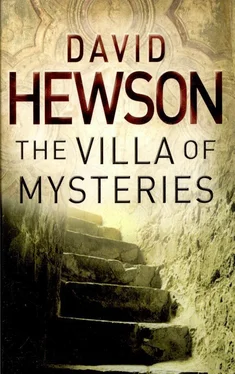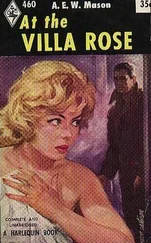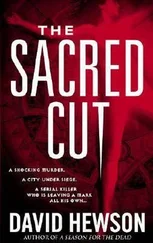His eyes sparkled when he spoke of her. “She took every good point her mother possessed and just made it bigger. Even at sixteen she was just full of life, involved in everything. History. Language.” He waved his hands around the room. “Let me tell you something I never told that woman from the DIA. Together Eleanor and her mother gave me… this.”
“How?” Costa wondered.
Some long-hidden pain flickered in his eyes. “Because they made me realize it existed. They had the education. They opened the eyes of some kid from the ghetto who’d only dreamed about things up till then. The guys back home put me through a law degree. I got a taste for Latin through that. But until Eleanor and her mom came along I just didn’t get it. The irony is that, if she were alive today, I wouldn’t be what I am. It was her disappearance made me consider what I was. Her loss reshaped my life. It was a bum deal for her. I wish it had never happened.”
He looked at Falcone. “Of course I knew there was a body. A parent who loses a child, even a stepparent, looks at the newspapers differently. We think: is this the end? Do we now know ? Because that becomes the source of the pain. Not the loss itself. Not the images in your head about how she might have died. It’s the absence of knowledge, the doubt that nags away at you, day and night.”
Wallis made a gesture with his hands. He had no more to say.
“You could have called us,” Costa said.
“Every time a girl’s body is found in Italy? Do you have any idea how often I’d be on the phone? Do you know how soon people would start labelling me a crank?”
He was right. Nic Costa had seen enough missing person cases to know what happened when the investigation dwindled to nothing: no body, no leads, no clue as to how someone had disappeared. There was all too often an awkward juncture at which the grieving parents became a burden, one which ought to be supported by the counselling services rather than the police, since they were the only ones who, in truth, could help.
“You’re sure?” Wallis asked again. “You’re absolutely sure?”
“Yes,” Falcone said.
“Yet the papers said something about the body being old?”
Falcone frowned. “It was a mistake on the part of the pathologist. She’d been laid in peat. It made it hard to carry out the normal tests. Also, I was on holiday. There was no one around from the original investigation who could put two and two together.”
“Everyone makes mistakes,” Wallis said. “What can you possibly want of me in these circumstances?”
“I need you to come to the Questura for formal identification.”
Wallis shook his head and almost smiled. “What’s the point in identifying a sixteen-year-old corpse? Besides. You said you knew it was her already.”
“It’s not what you think,” Costa intervened.
“No. I know that. They printed a picture of her in the papers. I saw it at the time and thought… maybe. But what you’ve got isn’t my stepdaughter. It’s a corpse. I’ll make arrangements with an undertaker for the burial. I’ll see her then, when we’re both ready.”
“No,” Falcone said firmly. “That isn’t possible. This is a case of murder, Signor Wallis. The body won’t be released until I allow it. If we bring someone to court…”
They all heard the uncertainty in Falcone’s voice.
Wallis stared at him. “If—”
“I need you to think back to that time again. We have to reopen the case. We have records but perhaps something else has occurred to you.”
“Nothing’s occurred to me,” Wallis replied immediately. “Nothing at all. I told you everything I knew back then. Now I remember less, and maybe that’s for the best.”
“If you think about it,” Costa suggested.
“There’s nothing to think about.”
“The girl was murdered,” Costa said. “Brutally. Perhaps in some kind of ritual.”
Wallis blinked. “Ritual?”
“An ancient Roman ritual. Dionysian perhaps,” Costa continued hopefully. “There’s a place in Pompeü. The Villa of Mysteries. A professor at the university wrote a book about how they might be interpreted. Have you read it?”
Wallis’s cropped head turned sideways. Something in this idea intrigued him. “I read history, not conjecture. I don’t know anything about any Dionysian rituals.”
Costa glanced at Falcone. The villa was full of imperial Roman artefacts. It had been built on the site of an ancient temple. For all he knew, Wallis spent six months of the year pursuing only his private, historical interests. It was inconceivable that he was entirely ignorant of the subject.
“Signor Wallis,” Falcone said quietly. “This may be coincidence, but another girl is missing. It’s possible she ran away today with someone. It’s possible, I put it no more strongly than that, that someone acted out these rituals when your stepdaughter was killed. It’s possible the same person is re-enacting them now. Do you have any idea whether Eleanor was mixed up in some kind of cult?”
Wallis’s passive face creased in surprise. “What? Are you guys kidding me? She was too smart to mess around with that kind of crap. Besides, I’d have noticed something, wouldn’t I?”
“And you didn’t?” Costa asked. “The day she went missing was just like every other?”
Wallis scowled. “I told you all this sixteen years ago. The day she went missing she climbed onto her scooter and rode off for the language school. I watched her go and you know something? I was worried. A kid like that riding a scooter through the middle of Rome. I was worried someone might knock her over. Shows how smart I was, huh?”
Falcone handed over one of the photos from Miranda Julius’s apartment: Suzi, smiling happily outside in the Campo. The man’s reaction was extraordinary. He seemed more shocked by this than anything else they had said or done. Wallis’s face creased with the same pain Costa had seen on the videophone at the gate. He closed his eyes and was silent for almost a minute.
Then he looked at them all, one by one, peering into their faces. “What is this shit? You think you can pull some kind of stunt on me?” Wallis shook his head, unable to go on.
“This is no stunt,” Costa said carefully. “That’s the girl who has just gone missing. She met someone. Someone who persuaded her to have the tattoo on her shoulder, the same one that Eleanor had. Someone who talked to her about these rituals, and told her something would happen. On 17 March, the same day Eleanor went missing. Do you know her?”
Wallis listened attentively. He took a final look at the photograph then handed it back to Falcone. “No. I’m sorry. I shouldn’t have lost my cool like that. The girl reminded me of Eleanor. Her hair… blonde like that. It’s just the same, that’s all. I suppose that’s what you wanted.”
Falcone avoided the man’s fierce gaze. “I want the truth. That’s why we’re here. Nothing else.”
“This is the past for me. You must have some ideas.” Wallis seemed to be pleading for a way out.
“Nothing,” Falcone admitted bitterly. “A corpse. A few coincidences.” He stared at Wallis. “And you.”
“I’m no use to you, Inspector. I’m no use to anyone. Just an old man trying to find a little dignity out here on my own. My stepdaughter’s long dead. I knew she had to be, years ago. You never really believe they just disappear like that, go marry, raise kids or something, and never call. Let me mourn her. This missing girl now… If there was anything I could do I would, I promise.”
Falcone was beginning to flounder. “I need you to come to the station. I need you to identify the body. Go over the statements you made—”
Читать дальше












